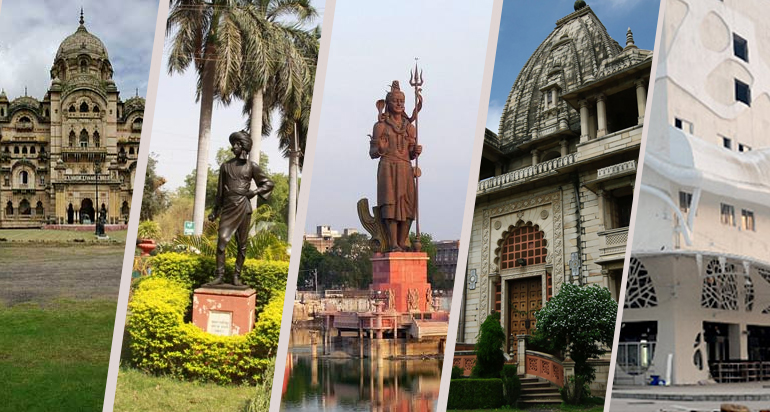NRI
- Why Invest...?
- Why VADODARA...?
- Key Development Indicators

Real estate sector is the second major contributor for GDP growth after agriculture. It is one of the most globally recognized sectors and comprises of four sub sectors - housing, retail, hospitality, and commercial. The growth of this sector is well complemented by the growth of the corporate environment and the demand for office space as well as urban and semi-urban accommodations.
Real estate sector in India is expected to reach a market size of US$ US$ 1 trillion by 2030 from US$ 120 billion in 2017 and contribute 13 per cent of the country’s GDP by 2025. Retail, hospitality and commercial real estate are also growing significantly, providing the much-needed infrastructure for India's growing needs.

Transformal shift in real estate sector in india
1) RERA
2) GST
3) AFFORDABLE HOUSING
4) SMART CITIES

Vadodara city is now booming and has the potential for increased growth and capital gains. Stable appreciation of property and promising future returns has made this city an ideal choice for new buyers. With the construction of international airport, Ahmedabad-Vadodara-Mumbai Expressway, Freight Corridors, Ahmedabad- Mumbai Bullet Train Project and Western railway lines have made good connectivity between metropolitan cities ,Tier-II & Tier-III cities.
Vadodara has been selected as one of the smart cities to be developed by the government of India. This has kick-started a large number of developmental projects that shall lead to greater improvement of civic facilities and enable growth of the city as a whole.
- An investment of USD 452 million is proposed under Jawaharlal Nehru National Urban infrastructure projects in the city.
- McKinsey & Company Report: Vadodara is expected to grow to 4 million population from the current level of 1.7 million by 2030.
- CNBC Awaz has rated Vadodara as one of the top 20 future cities of India.
- SIR coming up between Savli and Jarod at an estimated investment of Rs. 3500 Crores.
- Hero Motor Corp planning to invest Rs 500 Crores in Halol.
- Alstrom, General Motors, L&T, etc on an expansion spree.
- McKinsey & Company Report: Vadodara’s per capita investment requirement is to go up from 17$ to 263$ by 2030 and a considerable portion of that is in housing.
- Vadodara airport is proposed to be developed as an “Aircraft Maintenance Hub
? FAQs
An Indian citizen who stays abroad for employment/carrying on business or vocation outside India or stays abroad under circumstances indicating an intention for an uncertain duration of stay abroad is a non-resident. (Persons posted in U.N. organizations and officials deputed abroad by Central/State Governments and Public Sector undertakings on temporary assignments are also treated as non-temporary assignments are also treated as non-residents). Non-resident foreign citizens of Indian origin are treated on par with non- resident Indian citizens (NRIs).
A person of Indian origin means an individual (not being a citizen of Pakistan or Bangladesh or Sri Lanka or Afghanistan or China or Iran or Nepal or Bhutan) who:
- held an Indian Passport at any time, or
- who or whose father or paternal grandfather was a citizen of India by virtue of the Constitution of India or the Citizenship Act, 1955
The Overseas Citizenship of India(OCI) is an immigration status permitting a foreign citizen of Indian origin to live and work& in the Republic of India indefinitely.
Yes. NRIs can buy and sell residential and commercial properties in India.
There is no restriction on the number of residential or commercial properties an NRI can own in India. However, the law restricts NRIs from purchasing any kind of agricultural land/ plantation property/ farm house in India.
Yes, under the general permission granted by the Reserve Bank, property other than agricultural land/farm house/plantation property can be acquired by NRIs provided the purchase consideration is met either out of inward remittances in foreign exchange through normal banking channels or out of funds from the purchaser’s NRE/FCNR accounts maintained with banks in India and a declaration is submitted to the Central Office of Reserve Bank in form IPI 7 within a period of 90 days from the date of purchase of the property/final payment of purchase consideration.
Reserve Bank has granted general permission to foreign citizens of Indian origin, whether resident in India or abroad, to purchase immovable property in India for their bona fide residential purpose. They are, therefore, not required to obtain permission from the Reserve Bank.
They are required to file a declaration in form IPI 7 with the Central Office of Reserve Bank at Mumbai within a period of 90 days from the date of purchase of immovable property or final payment of purchase consideration along with a certified copy of the document evidencing the transaction and bank certificate regarding the consideration paid.
The following is the list (non-exhaustive) of documents required for NRIs to buy property in India:
- PAN card (Permanent account number)
- OCI / PIO card (In case of OCI / PIO)
- Passport (In case of NRI)
- Passport size photographs
- Address proof
An NRI/PIO cannot usually buy agricultural land/plantation property/farmhouses in India. Proposals to buy such land have to be specifically approved by RBI, in consultation with the Government of India. The only way they can acquire an agricultural land is by inheritance.
Yes, the Reserve Bank has granted general permission to NRIs to acquire or dispose of NRI India Properties by way of gift from or to a relative who may be an Indian citizen or a person of Indian origin (PIO) whether resident in India or not.
The Reserve Bank has granted some general permission to certain financial institutions providing housing finance e.g. HDFC, LIC Housing Finance Ltd., etc, and authorized dealers to grant housing loans to NRI nationals for acquisition of an NRI house/flat for self-occupation subject to certain conditions. Criteria regarding the purpose of the loan, margin money and the quantum of loan will be at par with those applicable to resident Indians. Repayment of the loan should be made within a period not exceeding 15 years, out of inward remittance through banking channels or out of funds held in the investors’ NRE/FCNR/NRO accounts.
The documentation required to be submitted by the NRIs are different from the Resident Indians as they are required to submit additional documents, like copy of the passport and a copy of the works contract, etc. and of course NRIs have to follow certain eligibility criteria in order to get Home Loans in India.
Another vital document required while processing an NRI home loan is the power of attorney (POA). The POA is important because, since the borrower is not based in India; the Home Finance Company would need a ‘representative’ ‘in lieu of’ the NRI to deal with and if needed. Although not obligatory, the POA is usually drawn on the NRI’s parents/wife/children/ close relatives or friends.
The documents needed for obtaining NRI home loans are Bank specific. General list of documents are as mentioned below:
- Passport and Visa
- A copy of the appointment letter and contract from the company employing the applicant.
- The labour card/identity card (translated in English and countersigned by the consulate) if the person is employed in the Middle East Salary certificate (in English) specifying name, date of joining, designation and salary details.
- Bank Statements for the last six months
List of Classified documents for Salaried and Self Employed NRI Applicants. Banks may have specific requirements apart from the below listed documents.
Salaried NRI applicants
- Copy of valid passport showing VISA stamps
- Copy of valid visa / work permit / equivalent document supporting the NRI status of the proposed account holder
- Overseas Bank A/C for the last 3 months showing salary credits
- Latest contract copy evidencing Salary / Salary Certificate / Wage Slips
Self-Employed NRI Applicants
- Passport copy with valid visa stamp
- Brief profile of the applicant and business/ Trade license or equivalent document
- 6 months overseas bank account statement and NRE/ NRO account
- Computation of income, P&L account and B/Sheet for last 3 years certified by the C.A. / CPA or any other relevant authority as the case may be (or equivalent company accounts)
The mere acquisition of property does not attract income tax. However, any income accruing from the ownership of it, in the form of rent (if it is let out)/annual value of the house (if is not let out and it is not the only residential property owned by that person in India) and/or capital gains (short term or long term) arising on the sale of this house or part thereof is taxable in the hands of the owner.
Yes. Long-term and short-term capital gains are taxable in the hands of non-residents.
In case of sale of immovable property, the Double Tax Avoidance Agreement (DTAA) with most countries state that capital gains will be taxed in the country where the immovable property is situated. Hence, if an NRI owns immovable property in India, then he/she will be subject to pay tax in India on the capital gains which arise on the sale of the property. Similarly, letting of immovable property in India would be taxed in India under most tax treaties.
